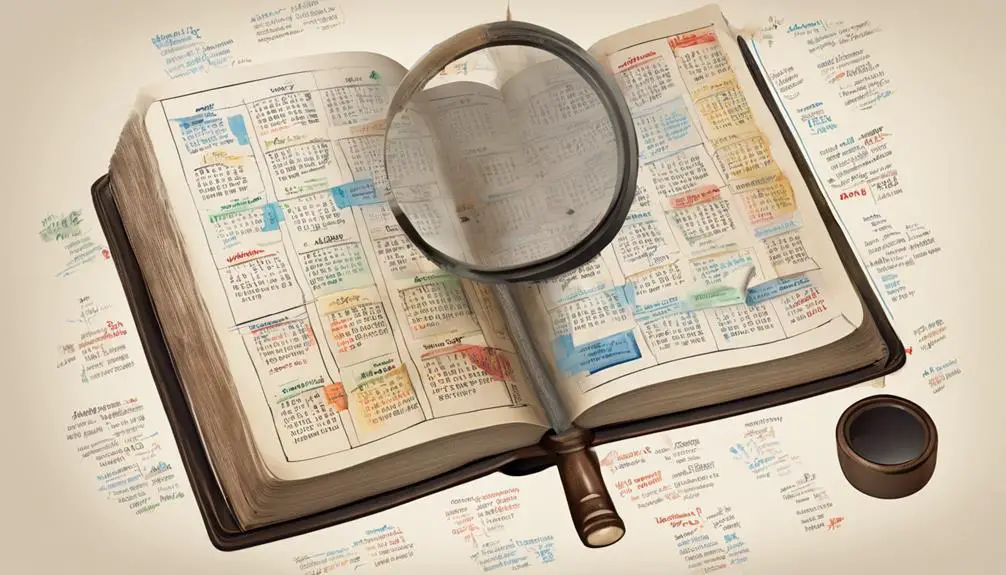Uncover profound wisdom and transform your perspective with our guide to reading the Bible in just a month.

Read the Bible in a Month
Navigating the Bible can feel like unraveling a massive ball of yarn; it's a complex task, but not an impossible one.
Over the next month, you'll embark on an enlightening journey through the Bible, absorbing its profound teachings in just 30 days.
With the right structure, tools, and commitment, this challenge can transform not just your understanding, but also your perspective.
Intrigued? Stick around, as we're about to break down the process.
Key Takeaways
- Allocate 90 minutes daily to read around 27,000 words for completing the Bible in a month.
- Use study Bibles, different translations, and a reading plan for comprehensive understanding.
- Stay committed by having accountability partners, reward systems, and consistent routine.
- Reflect on personal revelations and changes in perspectives to guide your spiritual journey.
Understanding the Bible's Structure

Before you dive into reading the Bible in a month, it's crucial to grasp the unique structure of this sacred text, which will guide your comprehension and interpretation. The Bible isn't a single book, but a collection of books written over centuries by different authors. It's divided into the Old Testament and the New Testament, each containing various genres—historical, poetic, prophetic, gospels, and epistles. This Biblical genres exploration is crucial, as each genre has its own conventions and should be read differently.
Understanding the chronological order significance of the Bible is another step in your journey. The books aren't organized chronically but thematically. For instance, Job, believed to be the oldest book, is situated almost in the middle of the Old Testament. Moreover, the four Gospels—Matthew, Mark, Luke, and John—tell the same story from different perspectives and aren't sequenced chronologically.
In essence, as you embark on this month-long reading journey, be mindful of the Bible's unique structure. Recognizing the different genres and the non-linear timeline will enhance your understanding of this ancient, yet profoundly relevant text.
Required Daily Reading Time

To successfully read the Bible in a month, you'll need to dedicate a significant amount of time each day to this spiritual endeavor, carefully considering the complexity and depth of the text. On average, you should allocate around 90 minutes daily, which might seem daunting initially, but with effective reading strategies and time management, it becomes manageable.
Remember, the Bible consists of approximately 800,000 words, which can be intimidating. However, breaking down the text into manageable sections is an effective reading strategy to combat this. For instance, you could divide the text by the number of days, reading approximately 27,000 words a day.
Time management, too, is crucial. Rather than attempting to squeeze your reading into one long session, consider dividing it into smaller, more manageable parts throughout your day. Perhaps you could dedicate time in the morning, during lunch, and before bed. This method not only makes the reading seem less overwhelming but also allows for reflection and deeper understanding of the text.
Essential Tools and Resources

Having the right tools and resources can greatly enhance your ability to read the Bible in a month, aiding in comprehension and retention of this profound text. These resources offer a structured way to manage your reading, allow you to engage more deeply with the text, and aid in understanding complex passages.
- Bible Translation Choices: Not all Bible translations are created equal. Some are literally translated word-for-word, while others are thought-for-thought. Consider using multiple versions to gain a comprehensive understanding.
- Study Bible: A good study Bible provides explanations, historical context, and theological insights for complex passages. This can be invaluable for understanding the Bible's deeper themes.
- Bible Reading Plan: There are numerous plans available online that break down the Bible into manageable daily readings. Choose one that fits your schedule and reading pace.
- Incorporating Prayer Routines: Prayer is a vital component of Bible reading. It helps you to focus your mind, open your heart, and seek divine guidance as you approach the text.
Tips for Staying Committed

While the right tools and resources unquestionably aid in your journey to read the Bible in a month, it's your commitment and consistency that truly make the difference. Harnessing the power of accountability partners and implementing a reward system can significantly boost your commitment levels.
Accountability partners, individuals who hold you responsible for your reading goals, are invaluable. They provide moral support, motivate you when you're flagging, and celebrate your achievements. A reward system, on the other hand, can make the journey more enjoyable. It's a psychological tool that reinforces your commitment to the task.
The table below presents some strategies for staying committed, their descriptions, and how they aid in your Bible reading journey.
Strategies |
Description |
Benefits |
|---|---|---|
Accountability Partners |
Individuals who hold you responsible for your reading goals |
Provide moral support and motivation |
Reward System |
Rewards you set for yourself once a specific reading milestone is reached |
Makes the journey more enjoyable and reinforces commitment |
Daily Reading Time |
Consistent time each day dedicated to reading |
Creates routine and enhances focus |
Short Breaks |
Brief moments of rest between reading sessions |
Prevents burnout and enhances comprehension |
Visualization |
Picturing the completion of your reading goal |
Provides motivation and a sense of direction |
Reflecting on Your Journey

As your journey of reading the Bible in a month unfolds, it's crucial to take time to reflect on your progress, lessons learned, and personal growth experienced along the way. Reflecting on this journey isn't merely an introspective exercise; it's an essential component of your spiritual transformation.
- Personal Revelations: What new insights have you gleaned from the scriptures? Have there been verses or passages that have particularly resonated with you? These personal revelations can serve as guideposts for your ongoing spiritual journey.
- Spiritual Transformation: Have you noticed changes in your attitude, behaviors, or perspectives since you started reading the Bible? This could indicate a deepening of your spiritual understanding and growth.
- Challenges Overcome: What difficulties did you face during your reading commitment, and how did you overcome them? These experiences can bolster your resilience and determination in other areas of your life.
- Next Steps: Based on your reflections, what're your future spiritual aspirations? Do you intend to maintain a daily reading habit, delve deeper into certain books, or perhaps start a Bible study group?
In essence, reflecting on your journey is a powerful way to deepen your understanding, strengthen your faith, and chart your spiritual course moving forward.
Frequently Asked Questions
Are There Certain Translations of the Bible That Are Easier to Read in Such a Short Timeframe?
Yes, translation impact can significantly affect your speed reading. Some translations, like the New Living Translation or the Contemporary English Version, are simpler and more modern. They're easier to understand quickly.
However, more literal translations, like the New American Standard Bible, might slow you down due to their complexity. It's crucial to choose a version that balances readability with accurate representation of the original texts.
How Does Reading the Bible in a Month Compare to Reading It Over a Longer Period of Time?
When you read the Bible in a month, it's a rapid comprehension exercise. You'll grasp overarching themes and narrative structures quickly. However, the spiritual impact may differ compared to a longer reading period.
Taking more time allows for deeper reflection and understanding of complex passages. So, while you'll cover more ground quickly, you might miss out on some profound insights that slow, deliberate study can offer.
Is It Beneficial to Have a Support Group or Reading Partner While Reading the Bible in a Month?
Having a support group or reading partner can be beneficial. Group accountability ensures you're consistent in your reading, providing motivation on days you might want to skip.
A partner's perspectives can enrich your understanding of the material, offering viewpoints you may not have considered. So, it's not just about staying on track, it's also about deepening your comprehension and making the reading experience more rewarding.
What Is the Best Way to Tackle Difficult or Confusing Passages in the Bible During This 30-Day Process?
When you encounter difficult or confusing passages, don't be disheartened. It's vital to seek contextual understanding. Look at surrounding verses, chapters, or even books. They'll often give clues to interpretation challenges. You can also use reputable commentaries or study guides.
Can This Method of Reading the Bible in a Month Be Applied to Other Religious Texts?
Absolutely, you can apply this method to other religious texts. It's about textual interpretation and a disciplined reading schedule.
You'll encounter complex passages, but don't let that deter you. Comparative study of different texts can deepen your understanding. Be patient with yourself, it's not a race.
Conclusion
You've now grasped the Bible's structure, acknowledged your daily reading time, and gathered essential tools. Remember, staying committed is crucial. Be patient and persistent, and let your journey be guided by reflection.
Reading the Bible in a month is a daunting, yet rewarding task. Embrace this spiritual journey as a chance to deepen your faith and understanding. After all, isn't it invigorating to challenge oneself for personal growth and enlightenment?
You're now all set to embark on this religious exploration.



Sign up